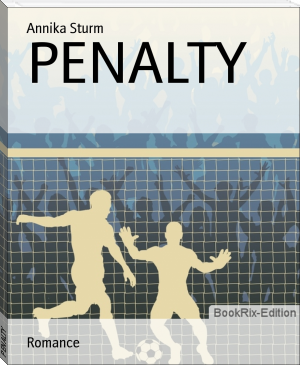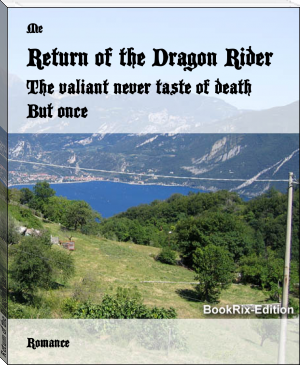If Not For The Knight - Debbie Boek (reading eggs books .txt) 📗

- Author: Debbie Boek
- Performer: -
Book online «If Not For The Knight - Debbie Boek (reading eggs books .txt) 📗». Author Debbie Boek
“Of course, love,” he responded, getting into the bed and pulling her head against his broad chest as she fell back into an exhausted sleep.
Gayle and Bernia entered the room a short time later and found the two of them sound asleep, cuddled in each other’s arms. Smiling at one another, the two women quietly stepped out of the room and closed the door behind them.
“So, Draco, what has been happening?” Calder asked later that day, feeling completely refreshed and at ease now that Regan was improving.
“I hate to ruin your high spirits, Milord.”
Calder looked at Draco and, with a heavy sigh, said, “Let me hear, Draco. From the look of you it has not been going well.”
“Someone started a fire in the stable and several of our men were attacked with stones thrown at them in the dark as they hurried to put it out. I do not know the identity of the culprits as yet, and feel the mischief has only just begun.”
“How much damage to the stable?”
“Little, we were able to put it out quickly. None of the horses were injured.”
Calder nodded. “Well, that is something good, at least.”
“And Filbert wishes to speak with you as soon as possible. I’m sure it’s to plead for the hag.”
“And if I do not allow her to return, things will get worse.”
“So, it would seem.”
“We shall see about that,” Calder said thoughtfully. “Bring him to me.”
“Yes, Milord,” Draco said, as he stood and made his way from the Hall.
“Good e’en to you, Milord,” Filbert said as he leaned forward on the table, hoping Calder would offer him some ale so that he could settle his nerves. His last conversation with the Overlord had not gone well and he anticipated that this one may not either.
“The people are very upset that you would banish two elderly people with little money and nowhere to go. You have sentenced them to death.”
“I banished only Esme, no one else. Are you aware of why I did so?” Calder was leaning back in his chair, staring at Filbert with cold eyes.
Pausing momentarily, Filbert replied, “Yes, I am, Milord.”
“And still you come to me asking for leniency?”
“You must understand, Milord, these are my people. They look to me to ask you for fairness, for justice.”
“Your daughter almost died. You did not even come here to see how she fared. You did not come to see if she still lived. You spent that time plotting with the same people who contributed to her circumstances, the ones who would not help her when she needed it most.”
Calder paused to stare at Filbert. He wanted to understand why a father would do such a thing, but was only able to find pity for an old man who was too weak to stand up for himself, a man who valued the opinion of others more than he did the welfare of his own daughter.
Filbert refused to look away from Calder, but could feel his face flushing in embarrassment.
“How can you come to me and ask leniency for a woman who called your child a whore and said she deserved to die, for an evil woman who wished for the death of your own grandson?”
“There is much you will never understand, Milord.”
“Enlighten me,” Calder replied coldly.
“You Normans came here and took everything from us. We have spent years rebuilding our homes, mourning the deaths of our kin and friends that were murdered on behalf of your King William. We finally got our crops growing again, and then you arrive. You take us away from our own fields to build your grand castle. We give you our blood, our sweat and our time, all at the risk of our crops, and then you take more than half of what we have for taxes. A man can only tolerate so much before he must forget about his fear and take a stand against his oppressors.”
Calder sat quietly, watching in amazement as Filbert continued his speech.
“Forgive me, Milord,” Filbert’s voice was rising as his emotions surfaced, “but we have given all we have to give. We cannot just accept it when you arbitrarily banish valued members of community, people we have known and loved for many years and who will die if they are sent from here. You have no right to do such a thing.”
Filbert jumped as Calder slammed his tankard of ale onto the table, spilling it onto both of them.
“You, hypocritical bastard,” the knight stated softly, shaking his head in disgust. “When my brother came here, he taught you all better ways of farming. He increased the yields of every member of this village and, in return, they refused to pay him his due in taxes. I build a castle to protect you and your people and my lands. That has been my primary purpose since I arrived here, but you refuse to see it.”
“I understand the anger you must have felt when we arrived, but enough time has passed and I have been very patient and very fair with all of you. I now expect my due. I expect the loyalty and the fealty of these people. They are no longer your people, Filbert. They will be my people and will do my bidding with no argument.”
“That will not happen, Milord,” Filbert replied bravely.
“Yes, it will. If not, they will not live on these lands. It is as simple as that. King William rules this country. I act in his stead, with all of the powers that he has granted me. There are homeless people throughout the country. They would be happy to come here and be part of my community, should you, and others like you, decide you cannot swear fealty to me.”
“I do respect you, Milord,” Filbert said icily. “You are intelligent, and when your anger does not cloud your judgment, you do try to be fair. But you will always be a Norman.”
“And what is your grandson?”
There was a momentary silence, and then Filbert replied, “A bastard, Milord, never to be accepted by either people. And that is your doing.”
The silence was so heavy in the room at that moment, that only the jangle of chainmail could be heard, as the knights shifted uncomfortably. Filbert misjudged the extent of their loyalty to Calder, and many were hard put to keep their swords sheathed when the old man spoke to him so disrespectfully.
Calder’s voice was cold and steady when he replied. “Yes, Filbert, it was my doing and it fills me with the greatest pride to know that I could create such a child. As Radolf’s father, I will let no one, Norman or Saxon, harm him. I will make sure that he feels so loved that it matters not if he is one or the other. He is my child and that is enough for me. Can you say the same?”
Filbert stared at him defiantly. “I love my daughter and my grandson, even if they have been disgraced because of you. You have no right to imply that I do not.”
“Even as you ask me not to punish the woman who would let your daughter die? Who said Regan was a whore and deserved such a fate.”
The silence was forbidding as Filbert answered. “That is what you made her in their eyes.”
A strong, feminine voice came from the bottom of the stairs. “And what of your eyes, Filbert? Do you also think of your daughter as such?”
All heads turned as Gayle walked toward the two men. Her face was set, her eyes snapping in anger.
“Of course not.”
“Then leave here. You will not defend the woman who was willing to let our daughter die. Do not embarrass me like this, Filbert.”
Their eyes met in a heated stare, each angrier than they had ever been with one another before.
“Regan is our daughter,” Gayle continued. “She is much more important than anything we have, including our so-called friends and neighbors. It’s about time that we started showing her that.”
Filbert glared at his wife for a moment longer, then stated quietly, “I will not be the one responsible for what happens now.”
He stood then and strode angrily from the Manor.
CHAPTER 22
Calder’s knights were busy that evening. Many of the villagers braved the cold night air to start fires and throw rocks and chunks of ice at the knights as they attempted to douse them. The knights’ frustration and anger increased and, inevitably, violence broke out.
“Milord,” Garrick said brusquely, as he strode into the Hall, “we are unable to control the mob. Per your instructions, we have not drawn our weapons. Now our men are getting injured.”
His tone was angry, almost accusatory.
Sighing deeply, angry himself that the situation was still so unstable, even after all of this time, Calder turned toward Garrick.
“From this day on, there will be a curfew at dark. Take all the men and roam the village. Be sure everyone knows that they must be inside their homes by the time the sun goes down, which will be shortly now. Anyone found outside once darkness comes will be tied in the cellar until it is my pleasure to release them. We will talk more this evening, Garrick, and decide what else needs to be done. But make sure we keep enough men outside on patrol during the night.”
“Yes, Milord,” Garrick said with a nod, turning to leave.
“And Garrick,” Calder said, halting him mid-stride.





Comments (0)